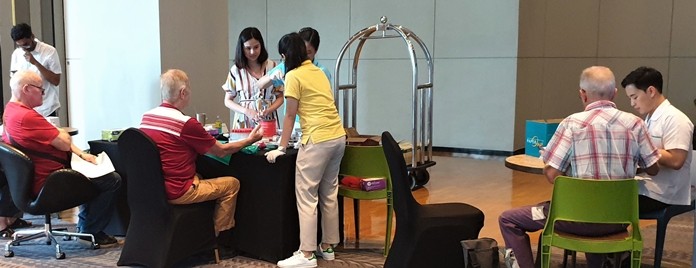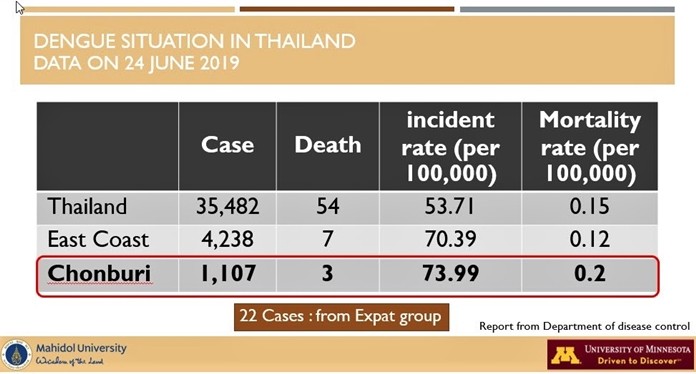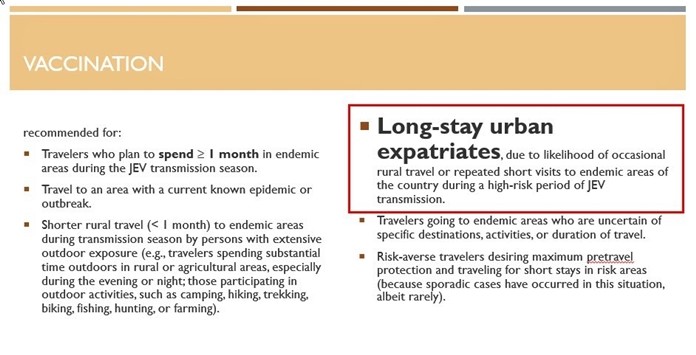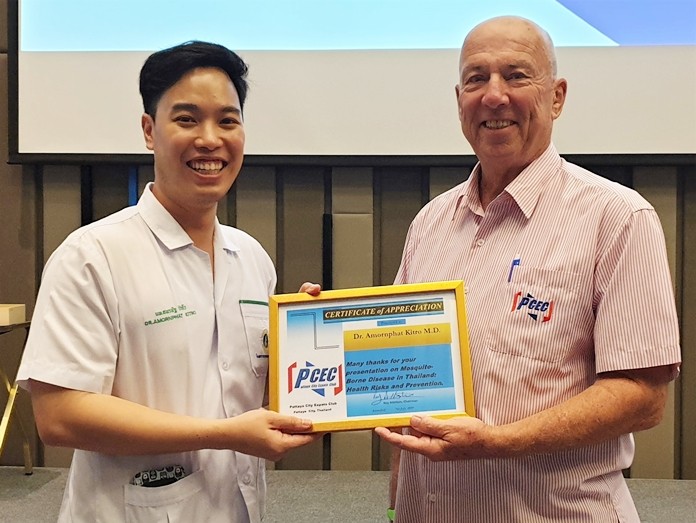
Three different activities painted the landscape of the regular morning meeting of the Pattaya City Expats Club on Sunday, July 7. First up was the Annual General Meeting (AGM) which is held the first Sunday of July, second was an opportunity to participate in a University study on Dengue Fever, Japanese Encephalitis, and Zika prevalence among expats in Thailand, and the third an informative presentation by the Study’s leading researcher, Dr. Amornphat Kitro, M.D., about the first two of these diseases, entitled, “Mosquito-borne Disease in Thailand: Health risks and prevention.”
The AGM began with PCEC Chairman Roy Albiston opening the meeting, which included the Treasurer’s report given by Judith Edmonds followed by the Chairman’s annual report, whose primary theme was ‘time.’ He mentioned that the Olympics, great sporting and performance events often depend on a small army of volunteers to be successful. He pointed out that it was about those that through volunteering of their time is what makes significant events and activities happen. Thus, the successful operation of the PCEC was no different.

He then went on to identify the important volunteers that made this happen. Even the speakers, he said, are volunteers devoting their time, which the club has had over a thousand during the past 18 years. Given recognition were the greeters, the tech team, the ‘mic matadors’ who pass around the microphone, the Club’s Thai helpers during the meeting along with a special thanks to Ren Lexander who arranges for the weekly presenters. Also recognized were those that devote their time to the Club’s weekly Newsletter, website content, and other activities.
Also announced were the new and not so new incoming Governing Board members with 5 having been re-nominated for another two year term and 3 members being nominated for their first term. The incoming Governing Board members are incumbents Anne Smith, Tom Loughney, Richard Smith, Robert Smith, and Darrel Vaught, plus new members Les Edmonds, John Stroosnijder, and Wendy Moore.
Taking place before, during and after the meeting, a small group of Mahidol University medical people were busy gathering forms, taking blood samples, blood pressure and sugar readings on many long term expats that wished to participate in a university research study entitled “Seroprevalence of Dengue, Japanese encephalitis, and Zika and risk factors for infection among long term expatriates from non-endemic country in Thailand.”
All this effort was going toward a study to determine how many long-term expats had antibodies present for those diseases. The school was thrilled that so much data could be gathered in such a short time and place. The club was promised a report on the results of the study when it was completed later this year. An added plus, participants in the study were compensated monetarily for their participation. This study was being funded by the University of Minnesota Academic Health Center’s Global Health Seed Grant program to support research in Thailand.
Following the AGM, Dr. Kitro gave a presentation on the causes, risks, and prevention of Dengue Fever and Japanese encephalitis, which are widespread throughout Thailand. Dr. Kitro is studying in residency training in Travel medicine and for a Master of Clinical tropical medicine at Mahidol University, Bangkok, Thailand.

The highlights of Dr. Kitro’s talk included the fact that there were four different strains of Dengue fever (if you got one you could still get another), that the disease had no effective vaccine or cure and can only be passed by from a mosquito biting an infected person then biting someone else. In rare cases the disease can be fatal if one contracts the Hemorrhagic Dengue which causes internal bleeding. If you have had Dengue previously, there is a higher risk of contracting the Hemorrhagic version. Over 100 million cases occur worldwide and the mortality rate is about 5%. Dr. Kitro mentioned that just a couple of years ago a famous Thai star succumbed to the disease.
The symptoms are usually high fever (40°C/104°F) plus at least two of the following: headache, muscle and joint pain, pain behind the eyes, nausea/vomiting, swollen glands or rash. Although not usually dangerous in the long term, it can be extremely uncomfortable and is sometimes called “breakbone fever” because of the severe joint pain. However, if you have the symptoms, you should seek medical attention because if it is the Hemorrhagic Dengue, it can be fatal because of internal bleeding. He mentioned an important caution; do not take aspirin or ibuprofen for the fever and headache as they are blood thinners which can increase bleeding if you have contracted the Hemorrhagic Dengue. Paracetamol (Tylenol) can be taken.
The second mosquito borne disease covered in the presentation was Japanese encephalitis (JE) which is the more dangerous of the two maladies, with a mortality rate of about 30%. Zoonosis (an animal disease) is spread to humans from Culex mosquitoes that feed on infected birds, pigs and other mammals passing the infection to humans living and working in rural areas around rice paddies and irrigation systems. Symptoms can be headache, painful neck stiffness, vomiting, fever, muscle weakness, seizures, and neurological damage.

However, this is primarily a rural disease and is not often encountered in urban areas. Further, there is a vaccine for JE which is available for foreigners and Thais. At Thai hospitals, the cost for this vaccination is about 400 baht and is recommended for those planning to spend extended times in rural areas. Japanese Encephalitis can be fatal in 20% to 30% percent of cases and many survivors continue to have long-term neurologic, psychiatric, or cognitive problems. Treatment includes supportive care of symptoms.
The presentation was followed by announcements and news of special interest groups, then the Open Forum where the audience can ask questions or make comments about expat living in Thailand, especially Pattaya. For more information about the PCEC, visit www.pcec.club.
 |
 |
 |





